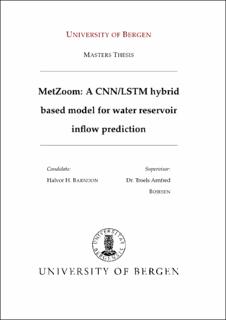MetZoom: A CNN/LSTM hybrid based model for water reservoir inflow prediction
Master thesis
Permanent lenke
https://hdl.handle.net/11250/3004276Utgivelsesdato
2022-06-01Metadata
Vis full innførselSamlinger
- Master theses [197]
Sammendrag
Hydropower reservoir volumes fluctuate as water levels increase or decrease according to precipitation, valve output and inflow through water retained in the surrounding area. Predicting these fluctuations with machine learning is possible through the use of an Artificial Neural Network (ANN) architecture proposed in this thesis. The neural network model aims to fore- cast the changes in relative water level for a reservoir managed by Saudefaldene, a hydropower company in Rogaland, Norway. The predictions are made through the use of radar images reflecting the precipitation rate, and a dataset provided by Saudefaldene. The provided dataset contains the precipitation history, valve-opening records and relative water levels across 2014- 2021. Such a forecast can have various impacts on hydropower reservoir management, which lay the foundation for the thesis. The architecture proposed in this thesis, namely MetZoom, contains a Convolutional Neural Network (CNN) architecture which predicts future precipitation rates in the form of radar image replications and precipitation i up to 12 hours ahead. The use of radar images is motivated by the intent to forecast precipitation as a tool for predicting changes in the relative water level. The predictions made by the CNN are forwarded to a Recurrent Neural Network (RNN) in the form of a Long Short-Term Memory (LSTM) network to learn the fluctuations of reservoir water levels. The architecture of Met- Zoom is a result of several tested CNN and RNN models and a combination of these.
